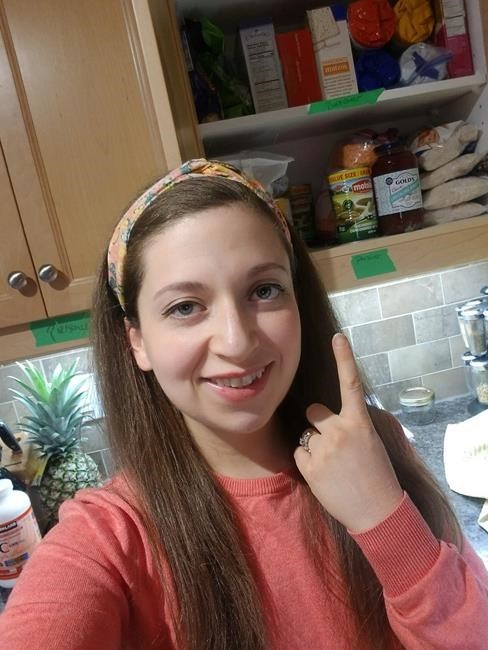
Michelle Devorah Kahn, 30, stands in her Ottawa kitchen, in this handout image, as she shows off her shelves organized and ready for the Jewish holiday of Passover, which begins April 8 at sundown. Usually, Kahn travels to celebrate the holiday with her family but COVID-19 means this year, she’s staying home. THE CANADIAN PRESS/HO
April 07, 2020 - 2:23 PM
OTTAWA - There's a question asked each year by Jews as they begin the Passover holiday: "Why is this night different?"
It's asked as a way into the telling of the Passover story, an ancient tale of the enslavement of Jews in Egypt, and their eventual freedom, that is at the heart of the holiday beginning Wednesday night.
But this year, the question takes on new meaning.
The COVID-19 pandemic has forced the cancellation of gatherings large and small, and religious observances are not exempt.
It's led to a debate about the Passover seder, the evening event that sees families welcome those from near and far to tell the Passover story, eat traditional and symbolic foods, and sing prayers and songs.
Public health and government officials have stressed that though it may hurt, the gatherings need to be cancelled this year. The message was repeated by the deputy prime minister Tuesday.
"This year celebrations will feel very different as all of us find ways to meet with our families and friends virtually rather than in person, but it is absolutely crucial that we continue to follow these rules to protect our families, our friends, our neighbours and our country," Chrystia Freeland said.
Religious leaders are saying the same. A consortium representing Orthodox Jews issued an extraordinary communique Monday, saying people need to stay home. Previously, its message was that seders were OK, if particpants had quarantined for two weeks first.
"Travel to other cities, or visits with family even within your city, should be cancelled," the statement said.
It's left people like Michelle Devorah Kahn wondering how to pack as much meaning into the holiday.
Kahn, 30, and her husband live in Ottawa, their parents in Montreal and Toronto. They usually travel to be with them for Passover. Her mother's house, she said, is normally packed to the rafters with people, the table laden with food.
But this year, Kahn will stay in Ottawa and prepare a simple supper with her husband.
"We'll do the best we can, with what we have," she said.
There will be other changes to mark a pandemic Passover.
Ordinarily Kahn gets rid of all the products in her house that aren't kosher for Passover. But this year, she has a stockpile of staples because of the pandemic, and she's not giving them up.
Kahn said her family also avoid using electricity on the Sabbath and Jewish holidays, but they are making an exception so they can use Zoom, the video-conferencing software.
Though a "Z-eder" might not have the same feel as seder, being able to "be" with her parents matters more, she said.
"It is going to be a unique Passover," she said. "And maybe one of our most memorable."
Religious and community leaders have moved to address how people can abide by the laws and customs of Passover in the midst of the pandemic.
Beyond Zoom, there is the issue of kosher for Passover goods. Ingredients prohibited on Passover can be found in a range of items. In Toronto, a group of health-care providers worked with the body that oversees which products are or aren't kosher to declare all hand-sanitizers OK; the sources of the particular alcohol in some sanitizers might put the products in question.
But regardless, they pointed out, it's usually best to just wash your hands.
A ritual washing of hands is part of the seder itself, and multiple jokes are circulating online about how it has suddenly become the most important part.
Kahn said she also sees resonance in another element, the plagues. Part of the Passover story involves 10 plagues experienced by the people of Egypt for refusing to free the Jews.
Kahn said while it's easy to see COVID-19 as a plague, as people suffer and die, it also forces seders back to the basics.
"What the story is about is our freedom, and this year we don't feel so free."
An opportunity to rethink what and how seders can be run was part of this year's Passover prep for PJ Library, a not-for-profit that runs engagement and literacy programs for Jewish families across North America.
Recognizing that many families would be running their own seders for the first time, they updated their Passover resources to include videos and a "cheat sheet" to help people make sense of the ritual and stories.
There's a lesson to be found in the three symbolic foods of Passover, said Meredith Lewis, the director of content, education, and family experience for PJ Library.
The unleavened bread, known as matzah, the bitter herb and a shank bone point to the individual experience of Jews in their homes in ancient Egypt, waiting for their eventual release from slavery.
"This year, we are in our houses with our families, under this cloud," she said.
"But we must remember that now — and then — on the other side of the door eventually was freedom."
This report by The Canadian Press was first published April 7, 2020.
News from © The Canadian Press, 2020